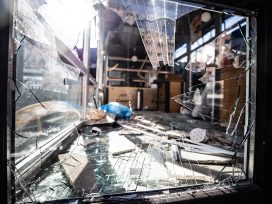The future of the global cities
The discussion about cities, their geographical, spatial and architectural composition, the political and cultural impulses that resonate from it and its inhabitants that shape cities and are in turn shaped by them, are the object of different theoretical discourses and academic disciplines but also manifest themselves in art forms such as literature, painting and film.
The “city” is of interest to sociologists, political scientists, architects and artists alike and their research seeks to address the challenges that today’s cities must meet: Questions of the social and economic sustainability, questions of their future governance and administrative norms that arise through new dynamics between local governance, the nation-state and supranational institutions. The ways in which economic interests shape and define the landscape of modern cities as opposed to the wishes of urban planners and its inhabitants. The effects of mass tourism and globalisation on cities everywhere in the world – and the question whether cities will be able to maintain their distinctive character or will become reproducible and homogenised entities.
Eurozine has collated texts from European cultural journals concerned with different research angles on the city:
– The political future of cities
– Economics and cities
– Tourism and cities
– Urban planning for the cities of the future
By no means complete, these texts provide an overview over a field that has in the past, as urban studies specialist Rob Shields points out, suffered from its “inability to clearly define the focus of its field”.
Rob Shields outlines in an introductory interview how the city and the urban space have managed to attract such a wide interest as an academic discipline and also in popular culture. He shows how the urban space can be understood as an object of research and how urban studies can help to shape cities.
In a second interview, the renowned Serbian architect Bogdan Bogdanovic develops his view of the European cities: As he evokes the historical grandeur of Prague, Vienna and Belgrade, he warns that Europe must maintain its tradition of a “civilisation of cities” with the cultural and philosophical impulses that flourish from them. Bogdanovic also ponders how the relationship between citizens, the state and the city is about to change – will citizens continue to maintain their allegiance to the nation state or will cities become more important symbols of identification and belonging?
Two texts from the French journal “Multitudes” discuss how cities are shaped both by corporate interest groups and casual labourers on the other end of the spectrum. Thierry Baudouin analyses the city as a main public space in which workers must regain political control over its economic development that has fallen in the hands of corporate interests.
Arnaud Le Marchand investigates the role that casual workers play in the social network of cities. With their constantly shifting production locations, they prevent the fragmentation of the urban sprawl, Le Marchand argues and in doing so offer an alternative to a purely repressive governance of urban problems.
Cities however are not only shaped by its inhabitants and workers, but, as philosopher Boris Groys points out, more and more by the tourists who come to visit them. The “conservative gaze” of the tourist is directed towards the past and the historical roots of cities, rather than to the future and thus seeks to preserve a bygone image of a city. Moreover, the increasing flow of tourists renders cities more homogenous, as ideas, aesthetic, cultural and architectural styles and preferences travel with the tourists and dominate city landscapes all over the world.
The texts are available in the following language versions in Eurozine:
Andres Kurg, Rob Shields
Knowing the city (en)
How urban studies will help to shape the cities of tomorrow.
Samuel Abraham, Bogdan Bogdanovic, Miroslav Marcelli
The architecture of the European city (en) (sk)
The political dimension of the European cities.
Vincent Van Rossem
Full (en) (fr) (nl)
Van Rossem’s account on and remedies for the crowded cities of Holland.
Manuel Delgado
A city within a city (es)
What constitutes a modern city? The example of Barcelona.
Thierry Baudouin
The public spaces of the city (fr) (en)
Who controls and shapes the city’s public spaces?
Arnaud Le Marchand
The post-Fordist city (fr)
Casual workers prevent the social fragmentation of the city.
Boris Groys
The reproducable city (de)
(ru)
Will mass tourism and the impacts of globalisation spin out cities that are increasingly similar?
Published 18 August 2004
Original in English
© Eurozine
PDF/PRINTNewsletter
Subscribe to know what’s worth thinking about.


